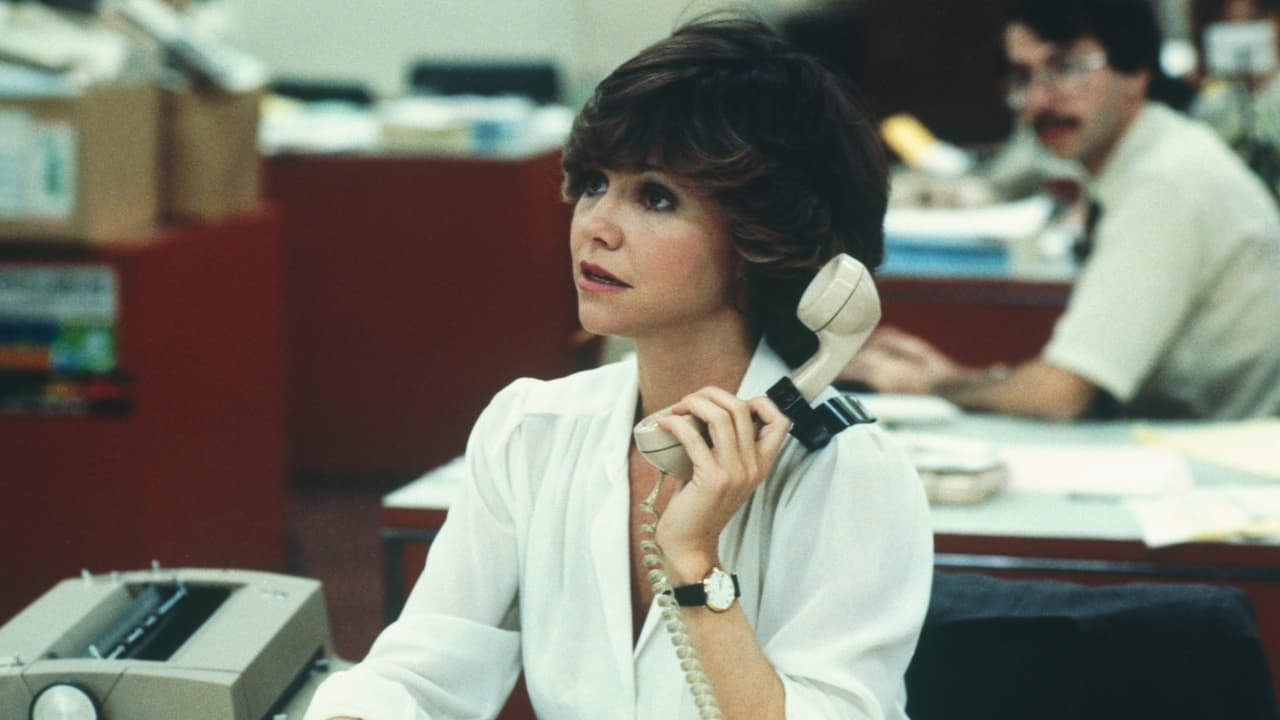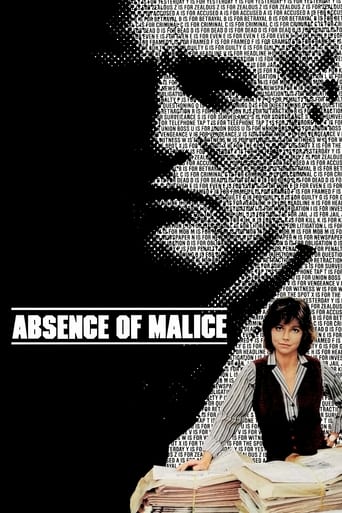

ridiculous rating
... View Morejust watch it!
... View MoreGood concept, poorly executed.
... View MoreFrom my favorite movies..
... View MoreThe premise is superbly intriguing: A man reads an article about himself in the newspaper one morning, which pretty much accuses him of murder. The movie, even with the likable and compelling lead Paul Newman, doesn't really deliver on its great intro.Paul Newman isn't happy with the article, and he tracks down the journalist responsible, Sally Field. I'm not really a Sally Field fan anyway, and this movie did nothing to change my opinion of her. I found her annoying, and it took all my strength to pretend to take her seriously. Since all my strength was used up, I had none left to focus on the plot, and with all the twists and turns, I got pretty confused. If you have no problem paying attention to who-said-what, who's-the-source, who's-after-who stories, and you don't mind Sally Field, you'll have a better chance at liking Absence of Malice than I did.
... View MorePaul Newman's hit piece on the press is pretty see-through in its intent. All because Newman had issues about people printing stories about him. So, what follows is a one-sided story about an incompetent reporter (Sally Field) and the press apparatus recklessly tearing into an innocent man (Paul Newman).Since the movie is as one-sided as it is, you would hope for some style from the script, but it's instead just plodding and without any style whatsoever. Field, who's shown herself as highly competent in films like "Norma Rae" inexplicably plays a complete ditz here. Newman just plays his stock Newman character.The way the story unfolds is clunky and unfocused. Throwing in a lot of mafia dealings, lots of unnecessary melodrama, and a kinda-sorta romance between the mismatched Newman and Field makes the movie thoroughly unwieldy.I've never been a fan of Dave Grusin's film scores, so his over-the-top music here again proves to be too much. Owen Roizman is a very good cinematographer, but his work can't help the movie with its issues.Sydney Pollack was always a director who was certainly the lesser of his contemporaries. Easily proving this is how much better a job Sidney Lumet did with Newman the next year with "The Verdict." And, it didn't hurt that Lumet had the great David Mamet writing the script.* (1 Out of 10 Stars)
... View MoreFilms about journalists have the ability to be hard-hitting, intense and topical stories that pack a mean punch. Look no further than All The President's Men for one of the finest examples of that, or more recently Rod Lurie's grossly overlooked Nothing But The Truth. However, when you take away that hard punch, you take away the soul of a journalism movie and the result ends up being quite flat. Absence of Malice is an example of the latter, a film that does a lot of things right but lacks a real flare for journalistic integrity.The story is vaguely interesting at times, but it never sizzles the way that it should and focuses too much on a half-assed and frankly uncomfortable relationship drama subplot. The main character is probably the most unprofessional reporter I've ever seen on film (honestly, people in that line of work should be offended) but looking past that, she's portrayed by Sally Field in one of the grossest examples of miscasting imaginable.This is a character who is supposed to be hotheaded, stubborn, all about the story and very, very stern, but Field isn't capable of playing any of those things, at least not at this point in her career. With her soft appearance and almost whisper of a voice, Field looks like a soccer mom trying to play reporter and it's kind of embarrassing how beneath the rest of the ensemble she is. There's strong supporting work by Melinda Dillon, Bob Balaban and Wilford Brimley, who only appears in one scene and completely dominates it, but it's no surprise that the star of the show is Paul Newman.Newman plays a member of a family with a criminal background who is slandered by Field's newspaper, and he portrays this with a kind of calm frustration that is fascinating to watch. This is an extremely intelligent man who knows all the roles that people are playing, but keeps all of this close to his chest and puts on the facade of the everyday man in the flannel shirt and blue jeans. It's primarily an internal work, with his world-worn face contrasted by the everlasting spark of those piercing blue eyes, but there are a few moments where he lets all of his rage out on the surface and delivers a shattering force of a performance.The movie is never hard to watch and moves along quite briskly, but ultimately it's a case of what it should have been rather than what it is. A journalist with no bite isn't going to leave much of an impression, and the same can be said about a journalism film. A disappointment coming from Sydney Pollack, who has delivered plenty of films with a lot more punch than this one, so you know he was capable of doing it proper. The title of the film is Absence of Malice, which is a slight irony since the product itself is lacking in any kind of strong emotion.
... View MoreAbsence of Malice isn't so much about duplicitous news reporting as it is about the consequences it results in. I suppose, due to the events that take place in this film, that we should feel somewhat betrayed by the media for foregoing the rights of privacy and jumping to conclusions they are still vague on. Nevertheless, Sally Field's reporter comes out somewhat heroic in this movie if only because of her ability to attract the protagonist, Paul Newman's nephew of a Mafia boss with his past and reputation hanging over his present situation. He's a nice enough guy, so if he likes this impetuous reporter, so do we.The result is a well-made, if somewhat erroneous story about the DA office, the newspaper, and a simple liquor salesman and how they all try to do their jobs in the wrong way. The acting is just fine here, especially from Newman who creates a sympathetic man trying to crawl out of the shadow of his family and play it straight in the real world. The scene-stealer is Wilford Brimley as the assistant attorney general who eventually is forced to come down to sunny Miami and sort out this whole mess. His few lines bring the film to a wonderful, funny conclusion.For director Sydney Pollack, this is a bit of a different stroke of the brush. He gives adequate time to discussions about the investigation and the ramifications it will bring. In the end, you get a strong sense of how these type of situations work and though the motives and actions of some of the characters, especially Sally Field's reporter, are highly questionable, as an entertaining story about the media and its interaction with the real world. It's actually amazing the parallels drawn between news reporting and criminal investigation.
... View More